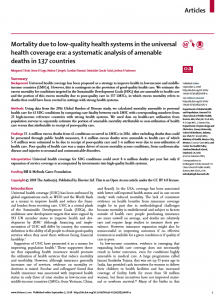
Universal health coverage has been proposed as a strategy to improve health in low-income and middle-income countries (LMICs). However, this is contingent on the provision of good-quality health care. We estimate the excess mortality for conditions targeted in the Sustainable Development Goals (SDG) that are amenable to health care and the portion of this excess mortality due to poor-quality care in 137 LMICs, in which excess mortality refers to deaths that could have been averted in settings with strong health systems.
- Deaths caused by poor-quality health care spanned the conditions included in the Sustainable Development Goals, including cardiovascular diseases, neonatal conditions and road traffic accidents.
- We regressed utilisation for each condition by gross domestic product per capita, percent of population living in rural areas, female literacy rate, land area, numbers of doctors and nurses or midwives per patient, and GBD study region on the basis of geography and epidemiology.
- After cardiovascular disease, deaths from neonatal conditions, tuberculosis, and road injuries comprised the most amenable deaths, with a total of 1·5 million deaths due to use of poor-quality services and 1·2 million deaths due to non-utilisation of health services.